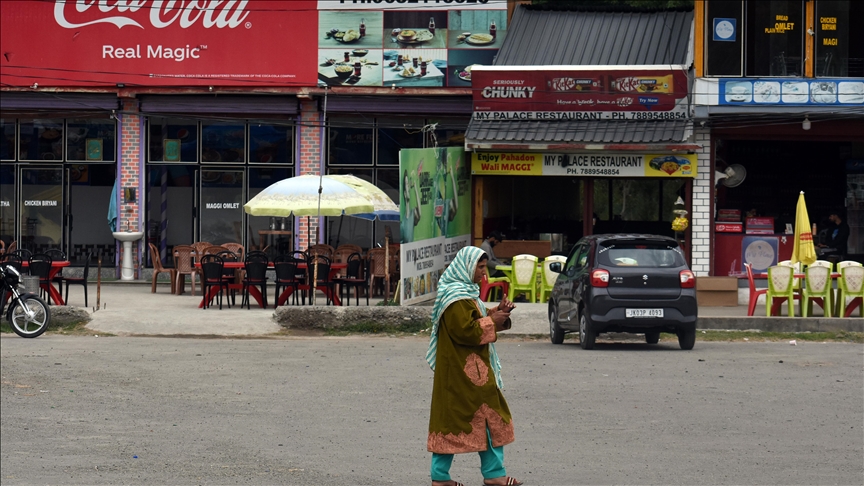Calm prevails in Azad Kashmir amid escalating tensions between India, Pakistan
Business centers across Muzaffarabad stay open as residents continue daily routines without signs of fear or panic

- Locals say they are accustomed to periodic rises in tensions between Pakistan and India
- India's attempt to unilaterally suspend Indus Waters Treaty could provoke strong reaction among Kashmiris, warns lawyer Majid Hussain Awan
MUZAFFARABAD, Pakistan-administered Kashmir
Life in Muzaffarabad, the capital of Pakistan-administered Kashmir, also known as Azad Jammu and Kashmir (AJK), remained calm and orderly on Sunday despite escalating tensions between the nuclear-armed neighbors following a deadly attack in Indian-administered Kashmir.
Tensions have been running high since Tuesday, when 26 people were killed by unknown gunmen in the touristic Pahalgam area of Indian-administered Kashmir.
The attack has further strained already tense relations between Pakistan and India over the disputed Himalayan region.
However, business centers across Muzaffarabad stayed open, and residents continued their daily routines, shopping and gathering without any signs of fear or panic.
Despite rising tensions after a deadly attack in Indian-administered Kashmir, life in Muzaffarabad, Azad Jammu and Kashmir, remains calm.
— Anadolu English (@anadoluagency) April 27, 2025
Residents say they are used to decades of friction, but experts warn India’s moves on the Indus Waters Treaty could trigger wider unrest… pic.twitter.com/NYc8T5VG7g
Muzaffarabad, a scenic city surrounded by lush green mountains and home to over 710,000 people, serves as the main commercial hub of Azad Kashmir.
When asked about the prevailing calm despite rising tensions, Muhammad Saeed, a young shopkeeper in the city's main market, told Anadolu, "This is not the first time. Tensions between Pakistan and India have been ongoing for decades. We are used to this situation."
Saeed added that the Pakistani military’s presence along the Line of Control (LoC) — the de facto border dividing the disputed region between the two arch-rivals — gives people "confidence that any potential Indian attack would be thwarted."
"The Pakistan Army is always ready at the LoC, so the public feels secure," he said.
Both countries ‘cannot afford war’
Political analyst Shaukat Iqbal echoed similar sentiments, noting that generations of Kashmiris have lived through periods of conflict over the past 75 years.
"This is not the first time people in this region are facing such tensions. That is why people are calm, and you do not see widespread fear here," Iqbal explained.
He emphasized that as both countries are nuclear powers, the likelihood of a full-scale war remains low due to the devastating impact it would have on the entire region.
"Pakistan and India understand that a nuclear war is not an option. However, it is possible they might engage in limited skirmishes along the working boundary or the LoC," he added.
Iqbal also expressed hope that world powers would intervene to prevent further escalation between the two sides.
Concerns over Indus Waters Treaty
Despite the calm in the capital regarding the current situation, some experts have expressed concern over India's move to suspend the Indus Waters Treaty.
Majid Hussain Awan, a senior lawyer based in Muzaffarabad, warned that India's attempt to unilaterally suspend the treaty could provoke a strong reaction among Kashmiris.
"People are very worried about the possibility of India stopping or diverting the rivers that flow from Indian-administered Kashmir into Pakistan via Azad Kashmir," Awan said.
He stressed that legally, India cannot unilaterally suspend the Indus Waters Treaty, which was brokered by the World Bank in 1960 and remains under its guarantee.
The water-sharing agreement established the rights and obligations of Pakistan and India regarding the use of the Indus River system.
Under the agreement, the six rivers of the Indus Basin were divided between the two countries. India received control of the three eastern rivers — Sutlej, Beas, and Ravi — while Pakistan was assigned the three western rivers — Indus, Jhelum, and Chenab.
Political parties show support for Islamabad’s measures
Political parties in Azad Kashmir have voiced strong support for Islamabad’s recent reciprocal measures against New Delhi, including the suspension of bilateral trade — even through third countries — and the closure of Pakistan’s airspace to Indian-owned or Indian-operated airlines.
“Leaders and lawmakers from all political parties discussed the current situation in Azad Jammu and Kashmir Legislative Assembly and we unanimously condemned the Indian actions, allegations against Pakistan and we stand behind Pakistani government and Pakistan army,” Chaudhry Latif Akbar, speaker of the Legislative Assembly, told Anadolu.
He described Islamabad’s actions as "necessary" steps in response to India.
New Delhi has labeled Tuesday’s attack a "terror attack" with "cross-border" links, blaming Pakistan.
Islamabad, however, has distanced itself from the attack, expressing "concern" and offering condolences to the victims' families.
Anadolu Agency website contains only a portion of the news stories offered to subscribers in the AA News Broadcasting System (HAS), and in summarized form. Please contact us for subscription options.







